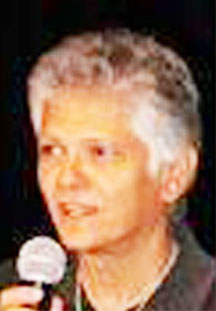Overseas-based Guyanese, Henry David Muttoo has been recognized by Queen Elizabeth II having been named a Member of the Most Excellent Order of the British Empire (MBE) in the Queen’s New Year’s Honours list.
Muttoo was recognized for services to art and cultural heritage in the Cayman Islands. He has lived in the Cayman Islands for a number of years and is the Artistic Director of the Cayman National Cultural Foundation (CNCF).
Muttoo headed the Cayman Islands delegation to Carifesta in Guyana in August 2008.
His profile on the CNCF website says that Muttoo is a 40-year veteran of Caribbean arts and cultural practices and is one of the region’s foremost cultural educators and theatre practitioners. “He is an award winning actor, director, and designer whose work has achieved acclaim throughout the region and internationally,” it says. Muttoo’s early theatre training was at the Theatre Guild here while his formal training was undertaken at the University of the West Indies, Trinidad & Tobago (Advanced Theatre Practices), Croydon College of Design and Technology, UK (Dip – Theatre Design), and Manchester University/ Rose Bruford College, UK (MA – Theatre Practices).

He has been involved with Caymanian theatre, arts and culture for 24 years, the last 18 as the Artistic Director of the CNCF. Muttoo is also a member of the CARICOM Regional Cultural Council and the Caribbean Examina-tions Council Advanced Proficiency Panel.
According to the West Indian Encyclopedia, Muttoo is widely recognized as one of the Caribbean’s leading theatre practitioners, and arguably the region’s finest theatre designer. He is, his profile says, “a rare talent with a multiplicity of artistic skills: he is an award-winning actor, theatre director and designer, carnival designer, painter, writer, editor and amateur calypso historian.”
“His vision for the development of culture and the arts in the Cayman Islands has advanced the Cayman National Cultural Foundation from an organisation that only managed the Harquail Theatre to one that is now a fully fledged and widely respected arts organisation producing several plays, two annual major arts festivals, training young Caymanians in several arts disciplines, documenting cultural enactments and re-enactments, publishing poetry, plays, an arts & culture journal and other material, offering grants to artists, recognising and promoting the work of talented Caymanians, and working with educational institutions to improve the quality and quantity of work produced by young people,” it says.
In an interview with this newspaper in 2008, he had called for the entire structure of Carifesta to be revamped. He said that Carifesta is excellent for the Caribbean but suggested that it needed to be re-examined. He believes that it would be better if Carifesta is reduced to a smaller festival in which only the very best artists of the region participate.
According to him, “Carifesta is now a free-for-all since anybody can come.” He noted that artists are driven by their egos and would want to be recognised for outstanding work and will no doubt improve.
He went on to explain how the very best could be selected. He said that different territories could be picked to host preliminary festivals for a specific discipline to which all the regional artists in that particular field would be invited. From these preliminary festivals, the best should be determined and only they should be allowed to participate in Carifesta. Muttoo said further that under this system, the festival would have to return to the initial format of being hosted every four years, so as to allow time for the preliminary events to be held. Currently the festival is held every two years.
He also asserted that the organising committee of Carifesta should be free of political interference. “The government of the host country should fund the event and stay out. Let the artists do their thing,” he told this newspaper.
Yet, he was adamant that “Carifesta needs to be run like a business.” He said that there needs to be a strategic plan and then finances should be provided by the government to implement this plan. But he insisted that the Secretariat or whoever is in charge of Carifesta needs to be audited.
He identified the first Carifesta in Guyana in 1972 as leaving an indelible mark on him and suggested that was one of the main reasons why he returned for the 2008 Carifesta.





